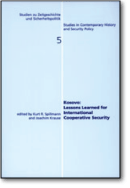Kosovo: Lessons Learned for International Cooperative Security

Autor(en): Andrew Denison, Roberta Haar, Lukas Haynes, Joachim Krause, Anastasia Mitrofanova, Domitilla Sagramoso, Kurt R. Spillmann, Albrecht Schnabel, Ekaterina Stepanova, Johannes Varwick, Eric Witte
Herausgeber: Kurt R. Spillmann, Joachim Krause
Serie: Studien zu Zeitgeschichte und Sicherheitspolitik
Ausgabe: 5
Verlag(e): Peter Lang
Publikationsjahr: 2000
Publikationsort: Berne, Berlin, Brussels, Frankfurt a. M., New York, Oxford, Vienna
